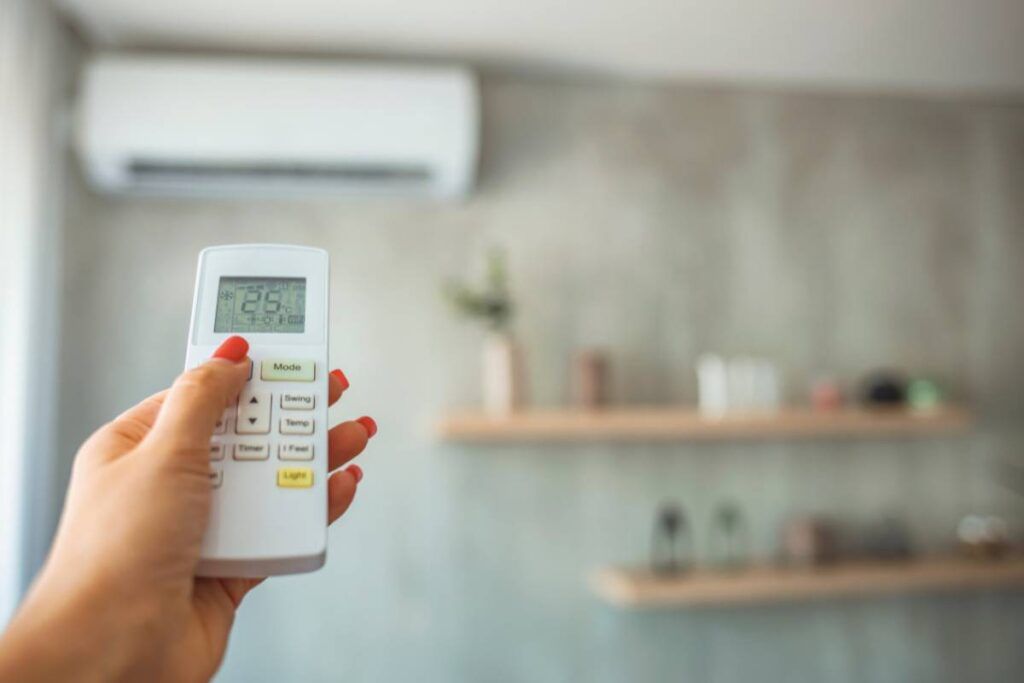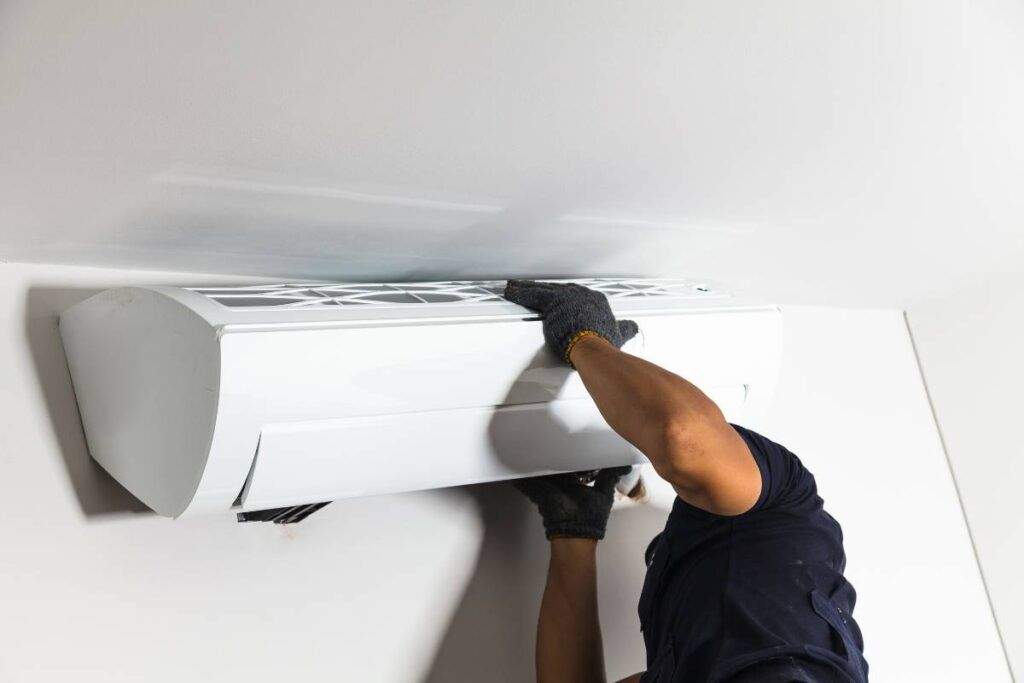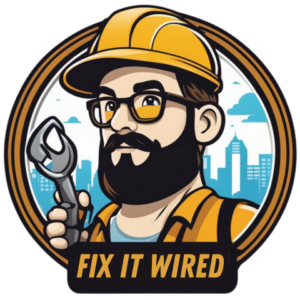Everyone’s best friend is a good and efficient air conditioner during the summer. But if the unit keeps running constantly, that could be a matter of concern. Constant running of the air conditioner can increase your energy bills.
An AC constantly runs because of a faulty thermostat, stuck compressor contactor, incorrect unit size, or wrong blower fan setting. Correct the thermostat setting and check the compressor and blower fan settings to fix it. Buy the right AC size depending on your house size.
The list continues. This article discusses why an air conditioner is not turning off and how you can troubleshoot a few problems yourself. Even if you can fix some issues, only an expert HVAC technician will best guide you.

Check out our list of top-handpicked products for all your electrical, appliance, and HVAC system needs to keep your home running smoothly.
This post includes some affiliate links.Why is my air conditioner not turning off?
It is quite abnormal for an air conditioner to keep running.
Sometimes, it will keep running the whole day but fail to give the desired heat.
And sometimes, it will run even though you have turned it off.
It can increase the energy bills for your house without any benefit.
Here are some of the obvious reasons behind an AC not turning off and their solutions:
1. The thermostat is set to the ‘ON’ position.
The thermostat will have an ON and AUTO setting to operate your fan.
If your thermostat is set to the ON position, it signals your air conditioner to run constantly without stopping.
So, your air conditioner will keep running whether you turn the unit off.
Check the thermostat setting if your air conditioning unit is not turning off. It would be best to change it to AUTO.
When you keep the setting to AUTO, the unit will signal the fan that you can turn it on or off in sync with the air conditioner turning on or off.
But, if the setting is already in the AUTO option, there is some other problem that you still need to find.
2. Faulty thermostat

If the thermostat is at fault, your air conditioner will get affected and won’t stop running.
You can check the problems by cutting the power to the air handler.
If the condenser stops running when the power is off, the problem is with your thermostat.
To cut the power, unplug the yellow wire connected to the Y terminal in the thermostat.
Heat outside to check if the condenser is running or not.
If the condenser has stopped running, but the AC is still on, you need to purchase a new thermostat and install it.
But if the condenser keeps running, the problem is with the wiring.
3. Damaged thermostat wiring
Over time, your thermostat’s wires will wear out and get damaged due to old age.
The sheath of the insulation around the wires will degrade and expose the wires.
If the exposed wires touch each other frequently, your condenser will constantly run, so your AC won’t stop running.

Several conditions can make the wire exposed except for old age, for example:
- You have accidentally nailed a wire in the wall.
- Rodents in the wall chewed up the wire.
- The outside wall got hit by a weed whacker.
- The wire is at fault directly from the manufacturer.
You can check for the damaged wire easily by taking out the thermostat cover and having a visual inspection.
The outdoor wiring will have conduit protection.
If there is any damage to the housing, the wires might get affected.
If you find any damaged or loose wires, you must hire an electrician or HVAC technician to fix the problem.
4. Stuck compressor contactor
The contactor controls the electricity to the compressor.
If the contactor is open, the electricity cannot flow to the motor.
The electricity will flow when the contactor is closed.
When the thermostat setting is turned for cooling, the voltage is sent to the compressor contactor.
As a result, the contactor closes and powers down everything.
The problem occurs when the contactor contacts stick together due to excessive heating when the electricity arc passes through them.
When the contactor remains stuck and fails to disconnect, it shuts off the power, preventing the condenser and air conditioner from stopping.
Based on the damage level of the contactor, you can fix the problem or replace it.
To fix it yourself, try tapping on the contactor to check if the tapping force can break the contacts apart.
Take a small wire brush to clean them off.
If it does not work, the contactor might have been damaged.
You need to hire a professional HVAC to fix it.
5. Clogged ice in the evaporator coil

Clogged ice in the evaporator coil is quite common.
Ice getting inside the air conditioner is common, but ice getting clumped up will not make your air conditioner turn off.
When the evaporator coil accumulates too much ice, it gets frozen.
As a result, the air conditioner cannot reach the desired temperature goal.
It will make the unit keep running due to an incomplete cooling cycle.
Too much ice will also cause a refrigerant leak, which means your unit will fail to cool down your room.
You cannot fix the problem yourself.
You need an HVAC technician to replace the evaporator coil.
Please do not turn on the unit until it defrosts completely.
6. Improper AC size

The air conditioner works by absorbing the warm air from your house, separating the moisture from humidity, and cooling it.
The unit will keep doing it until the temperature reaches the desired one, i.e., the number you have set on the thermostat.
When it reaches the desired temperature, the air conditioner will shut off.
That is called the AC cycle.
The cycle typically lasts between 20 to 30 minutes.
Once the indoor temperature rises, the unit will begin another cycle.
But, if you buy an air conditioner that is smaller than your house needs, the cycle will not end, and your air conditioner will continue to run.
It will work very hard to reach the desired temperature to no avail.
As a result, the energy bills will rise.
You need to replace the unit with the right one.
How to buy the right size of air conditioner for the house?
To get rid of all the heat inside your house, you must select an AC that suits your house.
You need to know the BTU capacity of the unit and how much is suitable for your house.
For each ton of heat removed from the house, an air conditioner should need 12,000 BTUs.
For larger houses, the BTU will increase.
To select the right AC size, you must consider a few things:
- The construction materials
- Insulation type of your house
- Ceiling height
- People living in your house
- Amount of sunlight coming inside your house
You can ask for help from an expert to get the right unit size.
7. Old air conditioning unit

Old air conditioning units will have old parts, which cause malfunctions in your unit, for which it won’t stop running.
Some units last only for 15 years, especially in hot areas like Florida.
Sometimes, even the most promising unit will give up due to old parts.
In that case, you must replace your cooling unit with a new one.
Besides, the new one will be more energy efficient than the old one, which means you can save energy bills.
8. Dirty air filters

The air conditioner starts one cycle to reach the desired temperature.
After that, it stops and starts again when needed.
The dirty air filters block the airflow and prevent the AC from giving your room the desired temperature.
As a result, the unit will work hard and keep running to give you the required chill.
If the filters become dirty, you must replace them with new ones.
You can also wash the filter, dry it, and return it to your air conditioner if it is reusable.
9. Faulty fan switch limit
Even if your fan has the correct settings, the fan motor will continue running when the air conditioner is not cycling.
As a result, the AC will keep running and won’t shut off.
It happens when the fan limit switch is stuck in the override position.
You can fix it by resetting the limit switch near the blower fan to stop the fan and the air conditioner from running constantly.
10. Low fan speed
If the blower fan speed is lower than normal, the system cannot move enough cool air throughout your house.
If this happens, your air conditioner will work harder to give you the right temperature and won’t stop its cycle.
Dirt and debris over the fan blades will make the work difficult.
So, make sure that the fan is clean.
To clean the blower fan yourself, follow the following steps:
- Turn off the power to the indoor unit.
- Remove the access panel at the blower compartment.
- Unscrew the screws holding the circuit board. Let the wires remain connected, and remove the circuit board from the way.
- Remove the screws holding the fan assembly and carefully slide them out of the cabinet.
- Use a soft brush and slowly clean the dust and debris over the fan blades and cabinet.
- Keep back the blower assembly in the cabinet and secure it with the screws.
- Repeat the same with the circuit board and secure it.
- Screw back the access panel and turn on the power.
11. Faulty electronic control board (PCB Assembly) or short circuit

The control board is an integral part of your air conditioning unit.
It transfers signals and information from one part to another.
For example, suppose the temperature is high.
In that case, the temperature sensor will transfer this information to the electronic board to get transmitted to the cooling system.
The control board cannot send the signal if it is broken or at fault.
Even if you shut off the unit, the unit will keep running, waiting for the signal.
The same occurs when there is a short circuit.
In this case, you need a specialist to confirm and fix the problem.
Depending on the damage extent, you may need to replace the board or the entire AC unit.
12. Extreme high temperatures
Sometimes, your air conditioner will face difficulty turning off the cycle when the summer temperature is at its peak.
The unit will keep struggling to reach the desired temperature and keep cycling and running to give you the required cold air.
Set your thermostat temperature higher by 5-10 degrees to confirm the problem and shut off the unit.
If the unit shuts off completely, it is a sign that your unit has been overworking.
You might need a bigger one.
Contact your HVAC specialist to help you out here.
Since there are multiple reasons behind an air conditioner not turning off, the specialist can help you diagnose the correct reasons and resolve them quickly.
How to prevent the air conditioner from such problems?

You can stop your air conditioner from struggling due to the above reasons by regular unit maintenance.
Else, you will keep facing problems besides AC not shutting off, like, not turning on, water leakage, weird noises, etc.
Here are some preventive measures.
- Get a routine checkup for your air conditioner.
- Clean the extra dust, ice, and air particles from the unit.
- Buy a commercial-grade contactor to avoid compressor contactor problems. It might be expensive, but it’s worth it because it can stop the contactor from getting stuck.
- Take defensive measures for your thermostat and ensure no outside force damages it.
- Keep updated on your air conditioner’s parts. Even the slightest malfunctioning can raise problems.
These preventive measures do not guarantee the full safety of your air conditioner.
The measures cannot stop your unit from getting any problems, but they can delay the problem or reduce the damage level.
Final thoughts
There are many causes behind an air conditioner not turning off.
You must find out the real cause before troubleshooting the problems.
Otherwise, you can end up with the wrong cause and increase damage levels.
The reason could be an easier one, like a thermostat set to ON, or a difficult one, like a faulty control board, old AC unit, faulty fan switch, etc.
Sometimes, it is just the weather or small AC, for which the unit works hard to give you the required temperature.
Since there are many reasons, you might face difficulty in diagnosing the real problem.
In that case, you can contact your HVAC team to help you out.
They will help you find the right cause and solve the problem faster without extra time, effort, and charges.


